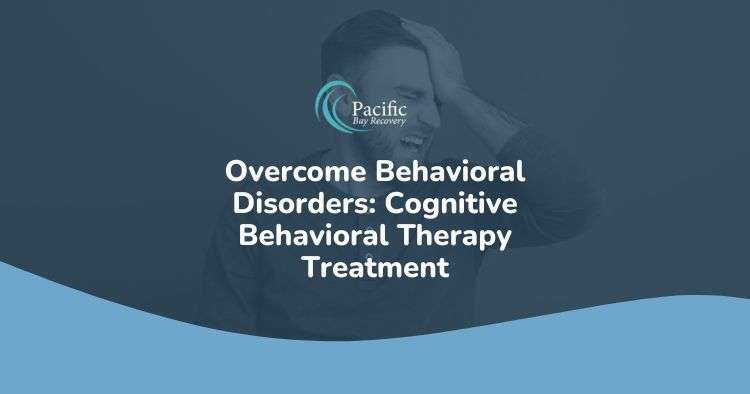CBT, or cognitive behavioral therapy treatment, is a goal-oriented, structured, form of talk therapy (psychotherapy). Therapists use it to manage or treat emotional concerns and mental health disorders.
The therapist will help you take a closer look into your emotions and thoughts. You will come to understand how those thoughts impact your actions. Through cognitive behavioral therapy, it is possible to unlearn negative behaviors and thoughts and learn to adopt healthier habits and thinking patterns.
Cognitive behavioral therapy may be used by itself or in conjunction with medicine and other types of therapies. The therapist will tailor your treatment plan based on the problem you are addressing. Our treatment centers San Diego covers this subject more in-depth below:
What is Cognitive Behavioral Therapy Used to Treat?
CBT is a valuable tool for managing and treating a broad spectrum of emotional challenges and mental disorders. People of any age (including kids) may receive cognitive behavioral therapy.
Therapists use it to treat many conditions and disorders, which include:
- Mental illness: Frequently, people with a variety of mental disorders respond well to cognitive behavioral therapy. It may help them with anxiety, depression, obsessive-compulsive disorder, phobias, or PTSD (post-traumatic stress disorder). CBT, when combined with medicine, is also helpful in treating schizophrenia and bipolar disorder.
- Eating disorders: Cognitive behavioral therapy treatment may help those with anorexia, binge eating disorders, or bulimia.
- Substance use disorders: Those with substance use disorders use it to support their recovery and adjust to sober living.
- Sleeping disorder: A common sleep disorder is insomnia that cognitive-behavioral therapy may help manage or treat.
- Chronic pain: Cognitive behavioral therapy treatment may teach those with fibromyalgia or other types of chronic pain disorders to manage discomfort in a new way.
- Daily challenges: CBT may benefit anyone struggling with life’s daily challenges. You may get help for problems like divorce, grief, relationship troubles, or issues at work.
How is Cognitive Behavioral Therapy Administered?
Usually, CBT treatment takes place over 5 to 20 sessions. Do not expect immediate results. Therapy usually takes time and occasionally includes uncomfortable work. Imagine the therapist as a partner working along with you through a process. If you continuously work together toward the same goal, you will have the ability to mark your progress over a period of time.
Here is how it works. The therapist:
- Gains an understanding of the issue you’re facing: At the beginning of therapy, you will talk about challenges you are dealing with, symptoms you have noticed, and all concerns you have. Inform the therapist if you have been diagnosed with a mental illness. It’ll help to set goals for the therapy.
- Asks questions: Depending on your circumstances, the therapist might ask questions. You may talk about an incident that happened in the past, phobias or fears, behaviors you’re having trouble with, or your feelings and thoughts. Together, you can explore the answers in order to obtain insight into how you react to life challenges.
- Helps recognize problematic behaviors and thoughts: Through the use of interactive Q&A sessions, the therapist encourages you to pay attention to how you react to challenging situations. You will work with each other to identify unhealthy behaviors, beliefs, or emotions that might be contributing to your problems.
- Works along with you to change your behaviors and thoughts: The therapist helps you figure out ways to change negative habits, thoughts, and emotions. It is possible to change your point of view and adopt positive behaviors and thought patterns. Then you’ll be able to apply these skills to future situations.
Changing Behavioral Disorder with CBT Treatment
Cognitive behavioral therapy treatment focuses on helping people learn to be their own counselors/therapists. Through certain exercises during the session, in addition to “homework” exercises outside of therapy sessions, patients learn to develop coping skills, in order to change their thinking for themselves, and change any problematic emotions or behavior on their own.
Therapists focus on the present, instead of what led up to the patient’s difficulties. The emphasis is mainly on moving ahead in time to develop more efficient methods of coping with life.
CBT Therapists and Treatment Centers
Therapists try to learn what their patients want out of life and help their patients achieve these goals. The role of the therapist includes listening, teaching, and encouraging, while the patient’s role includes expressing concerns, learning, and implementing that learning.
That is why it is so important to find a treatment center that specializes in CBT treatment for behavioral disorders. Pacific Bay Recovery specializes in cognitive behavioral therapy treatment. If you live in San Diego, CA, contact us today at (619) 350-8220.


